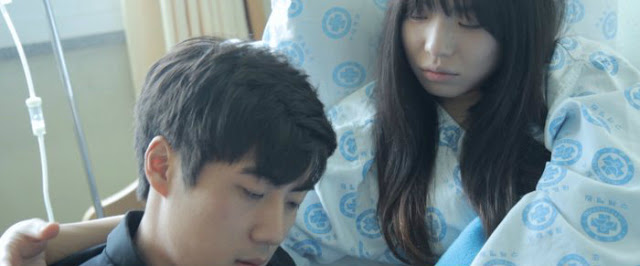It seems rather peculiar to this writer that horror films have, historically, represented the primary cinematic genre to utilise a found footage aesthetic.
Yet, as each of us in the twenty first century documents more and more of our day-to-day existence, as cameras pointed at our own faces have become part of our everyday lives, there is an inevitability that the way we tell stories about ourselves on the big screen will change from the methods of the past. Why, we must ask, should the naturalistic framework of found footage cinema be considered most fitting for movies about the supernatural?
As with all trends, it would appear South Korea has beaten the rest of the world to the punch.
Recording, a low-budget film by Park Min-kook, sculpts a movie which edits together fragments of a young woman’s life as filmed by herself and her friends. There is not a single demon or apparition instead but, simply, a series of moments each of us may recognise as we go about our day; snippets we recognise sometimes as banal, sometimes as profound. We see friends struggling with their computers and social shyness too, posing with Minions and gently ribbing each other for their own amusement. This, if you will, is a collage of life.
However, as our protagonist notes her stage four cancer early on in Recording's running time, each of the scenes in Park’s film takes on greater nuance and tragedy; this becomes a tale of living with the spectre of death looming over one’s shoulder. The silly and slight vignettes we see our characters experience, the types of which we could summon thousands of real-life examples of within an instance on Youtube, become loaded with immense subtext and deep meaning.
As the film unspools, we realise that life isn’t an action-packed melodrama after all (despite what years of watching cinema has tried to tell me). Life itself is fleeting and full of dull, boring, daft and seemingly inconsequential moments, each of which, however, add up to who we are – life can be tedious but even at its most unstimulating, life is beautiful. In this sense, Recording recalls one of the true great movies of Korean cinema - Christmas In August . Whilst there is nothing in Park's film which matches the transcendental joy of Hur Jin-ho's masterpiece (in particular the sequence involving the video remote), Recording nevertheless represents an innovative spiritual successor to the 1998 classic.
Formally, Recording is a movie which perfectly captures the time it was created in - this is a brilliant document to how we live now in 2016. These are ordinary people living ordinary, oftentimes inert, lives as we all do - by pointing cameras at ourselves, we hope to be filled with a feeling of importance. We hope someone somewhere is watching and we hope this validates us.
Yet, for the very same reasons which the film innovates, Recording is not an entirely successful movie. Whilst seemingly true to life and naturalistic, the vignettes which constitute the tale offer only a small degree of dynamic variance and often linger a little too long. That Park's movie does seem to reflect Youtube videos is both its blessing and its curse. Anyone who has ever watched a Youtube star's channel knows this about them - the "stars" are individuals with no cinematic background who are figuring out how to make videos, and edit them, on the job. These clips often fail to entertain or enchant for long periods of time and lack the fundamentals of drama, of concise story-telling, of cinema.
As a reflection of modern society Recording succeeds on multiple levels. As a truly engaging film, not so much. Alfred Hitchcock one compared film to life with all the boring bits cut out - Youtube and movies like Recording show this isn't necessarily the case.




No comments
Post a Comment